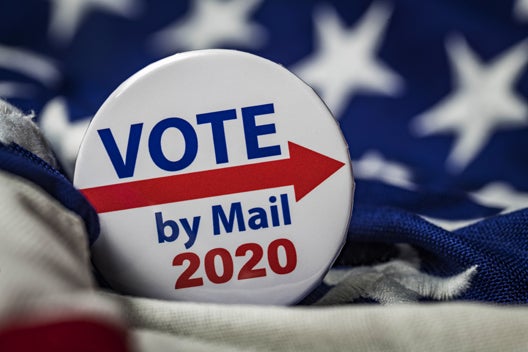Judge orders Tennessee to mention virus on mail voting form
Published 4:40 pm Wednesday, August 26, 2020
|
Getting your Trinity Audio player ready...
|
NASHVILLE (AP) — A judge has ordered Tennessee election officials to clearly communicate on absentee ballot applications that people can vote by mail if they believe they or someone in their care face a higher risk of COVID-19.
State officials promised the Tennessee Supreme Court this month that they would like to inform voters about that eligibility, asserting for the first time that underlying health conditions could qualify someone to vote absentee under their plan. Days later, justices overturned a vote-by-mail option for all eligible voters that Davidson County Chancellor Ellen Hobbs Lyle ordered in June.
In court, the state has described the process as an “honor system” in which voters decide individually if underlying conditions qualify them to vote by mail rather than risk infection at the polls. State lawyers told Lyle that voters can’t be charged with perjury for determining their condition makes them eligible.
But Lyle said the state isn’t being clear enough with the voters, despite the high court’s order to ensure voters are aware that underlying health conditions qualify a reason for eligibility to vote by mail. The absentee application doesn’t mention COVID-19.
“A prospective voter looking at the Form has absolutely no way of knowing that the Tennessee Supreme Court has held that if the voter determines for himself/herself that he/she has a ‘special vulnerability to COVID-19’ or is a ‘caretaker’ of such a person, he/she is eligible to vote via absentee ballot during the November election,” the judge ruled Tuesday.
The order gives the state until Aug. 31 to change the form, and until Sept. 1 to give county election officials corresponding guidance.
State officials had argued Lyle lacked authority to order the rewording, and said another change to the absentee application would confuse voters. The state also noted underlying conditions are now mentioned on its website and that it has sent out news releases to publicize the change, which requires voters to check existing boxes on the form for either illness or caretaking.
The ruling by Lyle would add wording to those existing boxes, describing “underlying medical or health conditions which in their determination render them more susceptible to contracting COVID-19 or at greater risk should they contract it.”
The issue brought the case back to Lyle’s virtual courtroom, where she and state attorneys butted heads multiple times over how to follow the vote-by-mail expansion that she ordered, the state opposed and the Supreme Court ultimately overturned.
One significant point of contention was the state’s decision to make its own changes to the absentee application outside of her orders, prompting a sharp rebuke from Lyle and an order to change the form so that COVID-19 wasn’t separated out from existing excuse categories.
Republican Secretary of State Tre Hargett’s office revisited that back-and-forth to criticize the judge’s most recent decision.
“It is ironic to us that the same Chancellor who chastised us for changing the form is now upset because we did not change the form,” Hargett spokesperson Julia Bruck said in a statement. “The Chancellor is legislating from the bench again.”
The American Civil Liberties Union, meanwhile, applauded the ruling and condemned the state’s opposition to it.
“Our state should be working to make it as easy as possible for people to vote, not creating obstacles at every turn and requiring a court order to fix them,” ACLU of Tennessee Executive Director Hedy Weinberg said in a statement.
Lyle also emphasized her dismay that the state waited until oral arguments before the state Supreme Court to reveal that underlying health conditions qualify voters to cast an absentee ballot.
If the state had taken that position in her court, she wrote, voting rights for those Tennesseans “would have been settled and known to them much earlier.”
“The State’s concession before the Tennessee Supreme Court came after time-consuming litigation that delayed certainty on a matter critical to voters,” Lyle wrote.
Lyle offered more criticisms about what she called “confusing and misleading” state guidance following the Supreme Court ruling, but said ordering more changes was beyond her purview.
For one, she said a new section of the absentee application about a reward up to $1,000 for reporting voter fraud leading to a conviction will have “the effect of confusing and intimidating voters.”





